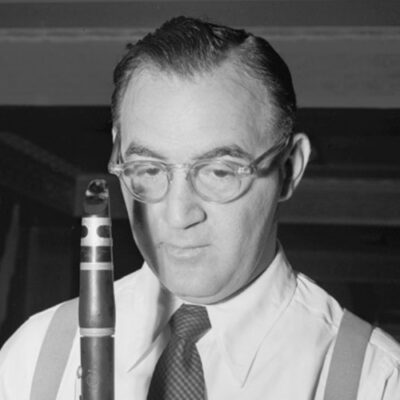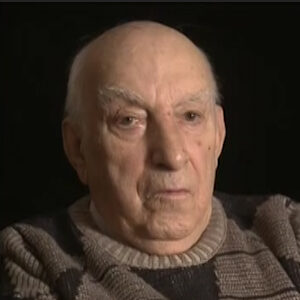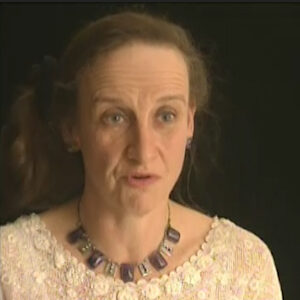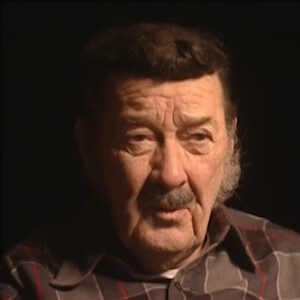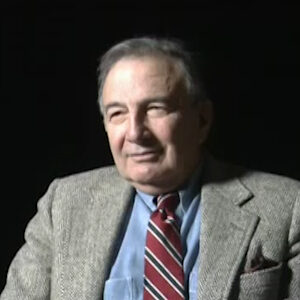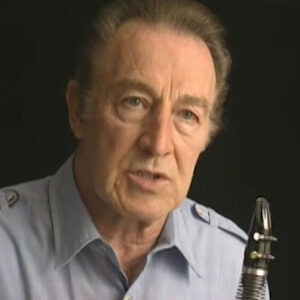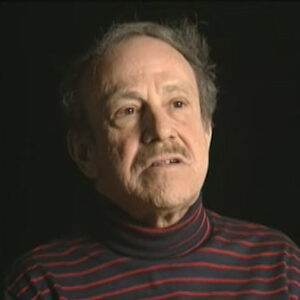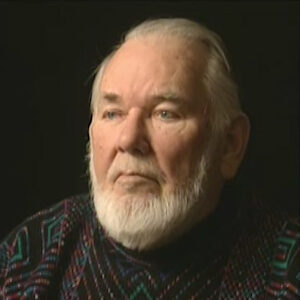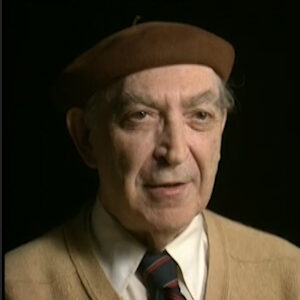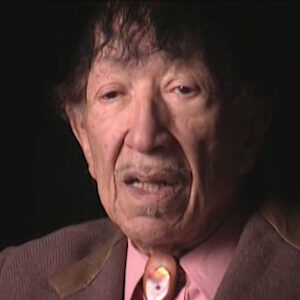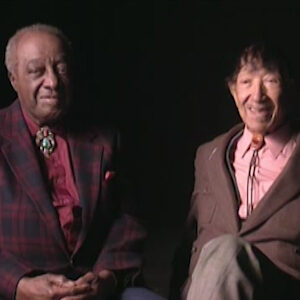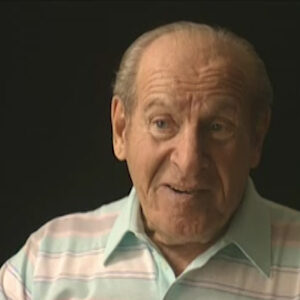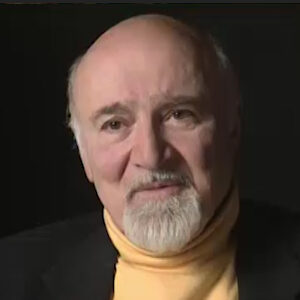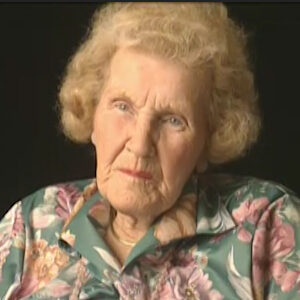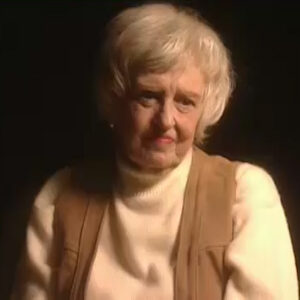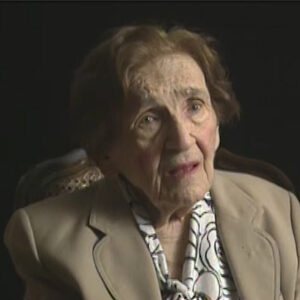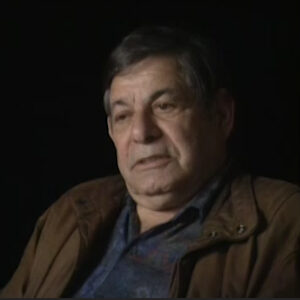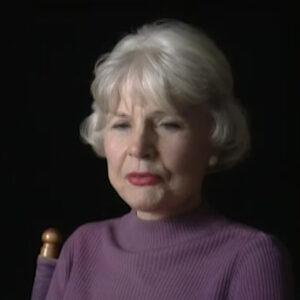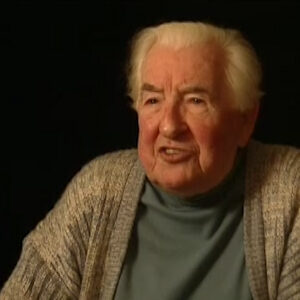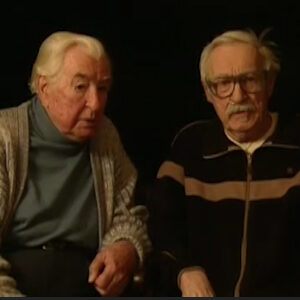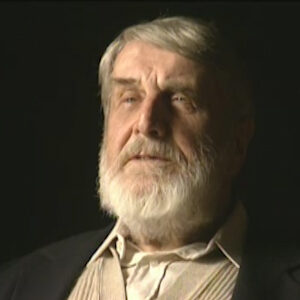Speaker Well, I remember an evening when I was staying with Benny up in the country. And Rachel had to go somewhere. I think it was probably a dance or a little rock concert or something. So then he was driving there. No, Benny is to call everybody. Hey, Pops, you know, he had he was infamous for his bad memory of people’s names.
Speaker So he would do that even with Rachel and Benji and the other kids. So we’re driving along and all of a sudden I notice I’m sitting in the backseat and Rachel’s saying, well, perhaps what time are you gonna come, come and pick me up? Okay, Pops. And she started thinking that Pop’s business, you know, and I thought, this is absolutely marvelous because she’s getting him right back.
Speaker Now, Charles Rosen, let me think. Don’t tell the piano players. OK? Just say, you know, wonderful classical piano, you know, whatever.
Speaker OK. OK.
Speaker One time, Rachel was studying with all the very good classical pianist in New York, and she was I knew him and I ran into him one day and I said, well, how’s Rachel coming? What’s she doing? She said, well, she’s doing some Mozart tonight. And I said, How’s it going? He said, just fine. He said, the only problem is every time she gets it down pat Benny steps and tells her how to do it.
Speaker And it absolutely ruins her telling that from her side. Her. Tell again the story about how you.
Speaker If you can lead in a sort of capsulized version that you were introduced to Benny by a mutual friend and you played you collected these things, the versions of his song. And that that sort of one in you that you.
Speaker She mentioned the kills him.
Speaker Well, rather not Country Road. Yes. Countryside visits.
Speaker Well, I had met Ben, he in the late 1930s, but the first time I really met him was at dinner one evening when some friends of mine invited me to dinner and invited Benny. And the host said, look, bring along that Benny Goodman record you have. And what it was, was an acetate that I had made and I had taken about five different records had Benny had made and he kept using the same introductory figure over and over again. So they’re all on this record. And we got up from dinner and the host said, well, Jimmy has a record here of here has been he had. Oh, I think you’ve ever heard. So he puts his acetate on. And of course, I didn’t really know, Buddy, and I thought I’ve no idea how I was going to react to that. So when it was all over, he just simply turned around, looked at me and he said, well, I guess I don’t have to do that again. So I thought, okay. The next day I got a telephone call from him and he invited me to lunch. That was about 1950, roughly he 49 50. And he just went from there until the day he died. The curious thing about it was I was having lunch with John Hammond.
Speaker I went from there. Be clear, just because we might get together like that for lunch, however.
Speaker Oh, I see. Right.
Speaker So he called me and we had lunch. And from then on in, we’d have lunch and dinner out her in. And then the odd thing about it was that I was never able not only to pick up my part and the time I couldn’t even reach for it. And I remember having lunch with John Hammond one day and telling him this. And John looked them. He said, well, you’ve got a footnote in James history. He’s holding one. They’d been here, knew where you couldn’t even reach for the tab.
Speaker Do we have a drug problem or. All right, we heard it, but I don’t understand. Everybody said. I mean, it’s it’s not pretty.
Speaker Let’s let’s, if you don’t mind, do it again just because we are a past a hope. All right. Usual that we do that noise. But it just I noticed there was a.
Speaker Well, what happened then was he called me the next day and invited me to lunch and then it started. We had lunch and dinner. From that time up until the a day before he died. So the curious thing that would happen at these lunches was how, you know, Benny was quite famous for when he played at the New York hotel is to call him Buffalo ahead because he would lose a nickel to ensure that penny pincher, while he was famous about being very tight with a buck. And so over the years, I was not only unable to pay for my own dinner or lunch or whatever it might be, I couldn’t even reach for the check. So I was selling this to John Hammond one day. And John said, well, he said, you’ve got a footnote in jazz history right there. He said, you’re the only guy who was never able to pay for a check with Benny.
Speaker Tell a little bit about it. Was it at a lunch like that that you and Betty talked about his father?
Speaker It was it was at the apartment. OK. I remember a day that we had lunch at the apartment in Manhattan House and we came out of the little dining room into the front room and sat down. And Benny, as he grew older, became very contemplative, at least in our talks.
Speaker And this particular day, he began to talk about his father. And he got very, very serious and all of a sudden he was talking about.
Speaker What a shocking thing it was to him as a little boy when his father would come home from work. And I’m wondering, well, you know, what’s he talking about? And he kind of leaned back, put his arms up on the Davenport and closed his eyes. And he said, well, you know, he would come back from work in these very high hip boots. And he said they absolutely stunk to high heaven. And I said, well, what was he doing? He said, well, he was working in the stockyards. Well, I’d never heard this story. And I said, I’ve never heard that. And he said, I know. I know, he said. But what happened was he was working in a part of the stockyards where they would take the hogs and and then finally the fat and begin to render it. And he would come out lard guns. Well, imagine stomping around in that stinking stuff all day long, and particularly for a Jewish man to be working hip deep in swine fat, you know? And it was a terrible moment. He just closed his eyes and stayed that way for quite a while.
Speaker Diddy each had other conversations with you about his father, where he talked about his father’s sacrifice or to do part of him or his father’s vision about music is an opportunity for his son or any of those.
Speaker But he knew that his father was very, very concerned about that.
Speaker I hear that you can have a lot more water.
Speaker Benny is a dog about his father from time to time. He had a very deep love and respect for his father and his father’s memory. And one day we came out of the little dining room.
Speaker We just said we don’t need to tell a story about the stockyard. Oh, oh, just a second, partner. I’m going to say about it, about the sacrifices. Oh, I see.
Speaker We got the difference, right? Yeah. Was the next section. Just start.
Speaker He was always very deeply aware of what his father had done for him when he was a little boy and turned him and Harry and couple of the other boys in the direction of music because. In the Jewish ghetto world that happened here in New York City, too, music was one of the ways out. And of course, generally it meant art, music, formal music. And so Benny was quite aware of what his father wanted him to do in music and what it meant to his father. Music. Yes, but a whole new world away out was the really important thing. And I think that was deep in Benny’s memory. And one day he said. He told me the story, and it’s a fairly familiar story, I think. But how he went to the newsstand where his father was working at the time, and Benny went to him and said, this must be about the time when he was 15, 16 and making a few bucks, you know, and doing well. As a matter of fact. And he said, Pop, he said, you don’t have to do this anymore. He said, you don’t have to be out here in the snow and the rain and all. And his father held up his hand and he said, Benny, Benny, you said you’re a good boy. He said, you take good care of your life. He said, I’ll take care of mine.
Speaker Did he ever tell you about the fact that his father was killed right when he was coming back to Chicago with the men? No. And about that experience and knowing that he had to take on the responsibilities of the family.
Speaker You didn’t say that he mentioned to me that he didn’t his father didn’t go to the South Hotel, the hero, because he didn’t have a suit.
Speaker I didn’t have a tie. He didn’t have a night. Yeah. Nice.
Speaker Tell himself that it was Betty coming back to Chicago. Well.
Speaker One of the things that Benny really wanted, I think, was when he came back to Chicago from California with Ben Pollack and he was playing in Chicago again, he wanted terribly for his father to come in here to see that he was on his way and the evenings went by and his father never came. And he finally, you know, he kind of talked to him about it. And his father was terribly embarrassed because he didn’t have a nice suit to wear to the dining room of the south. More hotel.
Speaker You you told me a story about Benny being in one of the teller shops where his father worked and a man coming in, if you can tell that someone.
Speaker I was telling that any one time about a great architect named Bernard Mayberg, who had worked in his father’s shop down on lower Broadway, and it’s back in the 19th century, and it was a shop full of wonderful German furniture makers. And one day a man walked in and he had a pork pie hat. And he was. We got. Got it.
Speaker We just got a tweet that goes by, we’d start again and again, I hate to feel like I’m censoring you would just simplify the story if you don’t mind saying I’m telling you about an architect in the 19th century will be writing about or getting.
Speaker I remember one time I was telling Penny about a 19th century architect who worked in his father’s furniture shop downtown here in New York. And one day a man walked in and he was so well-dressed and he wore a pork pie hat and he had beautiful yellow fawn gloves science about.
Speaker Oh, yes, they are.
Speaker The architect who worked in the shop and who spoke to me was telling, oh, all right.
Speaker I was tell you, Benny, one day about a famous New York architect who was working in his as a teenager and his father, a furniture shop down down on Broadway. And one day, a famous architect who walked in and he was beautifully tailored and he had a pork pie hat on and yellow gloves. And everybody in the shop started working and stopped working and started to follow him across the room. And when he got all through what he was doing in the Manoir gown, everybody followed him out. And this young man is his father. Well, what was that all about? And he said he was an architect. Well, this man from then on him. He knew what his mission in life was. He want to be an architect. When he saw the reaction and after I finished telling the story, Benny said, I want to tell you about going into a tailor shop one day. And he said this man came in and he had some suits over his arm and so on. And it sounded like the man was dressed like several rolled beautifully tailored. It so struck Benny the way this man was beautifully dressed. The shirting was perfect and a wonderful tie and so on. And so Benny told me that that had such an impact that elegance and style was the first time he’d ever sensed it and confronted it. And it had a tremendous impact on tremendous.
Speaker So we have a tag to lead into into that you said it. He was hanging around maybe where’s father?
Speaker I don’t know why. I don’t think this was his father. It was just a tailoring shop.
Speaker He may have just been taking something in to get cleaned.
Speaker I couldn’t have thought of that. You know, that this was the Benny himself was always very, very meticulous about his dress and his appearance, and he liked that idea of elegance in its presence.
Speaker I was very struck when I went out to Chicago to visit Holehouse. Not my idea of settlement house, was there some dingy little place where they helped, you know, waves. And it’s a very elegant, you know, home. The Jane Addams that opened at the met these kids, but they saw it in quite beautiful furniture and things. Did they ever talk to you? No, I never. How about his relationships with his other siblings? You mentioned a little bit.
Speaker You got to go before about, uh. I know someone who I filmed already. And Harry.
Speaker I don’t I don’t want to talk about any of the brothers.
Speaker You I wasn’t sure if you if you wanted to tell it. For the record, if you didn’t, the story about what his mother when he moved his mother.
Speaker No, I don’t want to get into.
Speaker Harry might. But I know one. Now, let’s go switch to Fletcher Henderson. You would suggest to me, which I never hear from anybody else, that Benny really almost. In retrospect, looked Fletcher like another father. He did so. 14 year old.
Speaker One of the things that happened very late in Benny’s life in those last few concerts right before he died. Something that impressed me, it was again and again. He wanted the audience to understand that this was Fletcher Henderson’s music. Fletcher Henderson’s way of arranging music and so on. And it came through to me that their relationship back in the thirties when he was getting started, that Fletcher had a very special role in Penny’s life. He not only brought the kind of music that would make its mark in his swing era and become, you know, the Benny Goodman music, so to speak.
Speaker Well, he had a deep, deep feeling about Fletcher and he would talk about him to me as well as he was terribly.
Speaker He wanted awfully much for the audience to remember. Fletcher Henderson. I think it’s Fletcher in some ways was almost like a surrogate father and Benny’s life. He was very attentive to him. He was terribly concerned at various times with his illnesses and when he had that stroke or several strokes. But he was always there. And I remember Leona Henderson, Fletcher’s wife, saying one time Fletcher had been at the top of the heap for many years and by the middle 30s, he’d started to fall off badly. And the horse said if it hadn’t been for Benny showing up and buying all the arrangements from Fletcher and establishing that relationship, that it would have been much, much more difficult for them financially. And of course, Benny picked up the cost. The medical costs on Fletcher’s illnesses and stroke and so on.
Speaker I guess it’s Ross Farfel. Maybe he talks about their role in any. After flexure, you after bidding, been a success in Fletcher’s band had been disbanded. He helped get Fletcher the job and the hotel in Chicago to replace that motel mechanic to replace Earl Hines. Reminds went on tour to the Rainbow Gardens.
Speaker No. Macon, Ga. No.
Speaker As a matter of fact, I don’t know about this, I found out about it like you wrote this book.
Speaker Let’s talk a bit about, uh, let’s dance. Because you didn’t play a bit of research about that and about, uh, you know, Joe Ghoneim and how the whole setup happened. Um, and I quote you gave me was within a couple of years and everybody needs to get a friend to play the ukulele.
Speaker You had to sort of come up with the right sort of tough challenge.
Speaker Do you want me to go back to the Music Hall and Bonnin coming in? Yeah. OK, fine.
Speaker And in this whole sequence, we could go on a roll. Is it you want to talk about Red and Mildred? And, you know, his relationship with Red Normal and how you first suggest that you and I, we have a lot of fun with Red. He talks a good, good role in helping find talent in Rangers.
Speaker OK. Hi.
Speaker The biggest break that many had, of course, was when he got the contract to play on the Let’s Dance radio show in the winter of 1934 35. Now, the way that came about is very interesting. Benny had a job and this was the first time he had his own organized band. He had pickup bands before that and did a one, you know, proms and recording dates and so on. But this was his own band, finally, and it was at Billy Rose’s Music Hall. Now, what happened there was quite a shock because all of a sudden they had their two weeks notice. Benny had been in touch because he was in the radio studio orchestras and had, as a matter of fact, had a marvelous position in the elite of the New York radio scene. And he was working, working until he put his band together and took a terrible risk. So one of the people, one of the conductors he played for and the big radio network programs, the studio orchestras, was a man named Joseph Bunim. Now, Joseph Bonnin was a very well trained and musician. He had been Misha, Ellman’s pianist, accompanist for about 10 years. And at some point he began to get into radio work and that led him into the advertising agency world, because by Robert, in 1927 or so, you begin to have network radio programs and nobody knew what they were doing, literally. How do you fill up all this time across the country? And so they threw together some wonderful programs. A lot of them would just fill in. And somebody once wrote a wonderful remark saying the saxophone at seven, meaning all the dance bands came on and filled up radio. Now, what happened to the music that the Billy Rose’s Music Hall was that Joseph Bohning told Benny and Harry Goodman had heard about it and was in the air. It’s in the gossip that they were putting together this big three hour radio program on Saturday night that would be called Let’s Dance. So Benny asked Joe bball name what was happening, and him told him, well, you can audition. We’re gonna have three different kinds of bands. We’re gonna have a Latin American type of band, rumba band, as they called him at that time. We’re going to have a big studio orchestra, which would be like somewhere in the gray area of between dance and concert. And then we’re going to have a hot pan and something that really has a bite to eat. And Benny, of course, wanted to audition for that. So Bonino said, well, I will bring the woman from the agency, the young woman who’s in charge of developing his program. She was like the I forgot the term right now in the advertising agencies. But anyway, she was in charge of the program. And so. Bonin said while he would bring his wife and this young woman to the music hall to hear Benny or Benny was very excited. So what he did, he took all of the best arrangements he had and put them all in one set.
Speaker Now, let’s say there were 12 or 14 really good arrangements and the band had them down paid by them and he ran through all of them and then immediately hit the set was over. Many came down to start to talk to Mr. and Mrs. Bowen name and to Dorothy Barstow from the agency. So he wanted to get them out of there as fast as he could because he didn’t want to know that them to know that he had absolutely taken his best shot at what he had. So they got up and left. And when they got out on the street job and he showed me a marvelous little story that he turned to, Dorothy Barnstone said, should I invite Benny to audition for the program? And she said, why not?
Speaker Years later, she told me and I reminded her of that. When that Bonnyman told me that, she said, oh, my goodness. She said, I was always saying. And in those days, why not? So the Benny audition. And of course, he got he got the spot on, let’s dance. And that started everything. So to speak.
Speaker I don’t know if that’s OK. Now, the hunt was on for Rangers was sort of the next thing. You tell me a little bit before that.
Speaker Now, of course, the problem that Betty had at the Music Hall was the problem that every young band had, and that is the book, the Library of Arrangements, and everybody whose stock arrangements at the pump, the music publishers put out and sometimes modified them and fooled around with them with Benny in that summer of 1934, before when he got an ability, Rose’s Music Hall, I remember read Norvo telling him a wonderful story about Red and his wife, Mildred Bailey, the great singer used to go into Billy Roses to hear Benny. They were very close. They were all good friends. And Mildred and Red were great, great encouragers. Yamhill as good friends should be. So Red told me that at that time, Benny had Begue borrowed or stolen some arrangements that he would have that would give him a little originality other than just playing stocks. So they were they would walk down the street together and read, said every time they would buy a musician that Benny knew somebody in somebodies band or an arranger, whatever, he’d stop man in the street.
Speaker Say, do you have any arrangements I could use? They go by somebody of another band leader or somebody they knew who might be an arranger or whatever. And Red said, but he was constantly stopping people and saying, look, do you have an arrangement I can borrow? Do you have an arrangement you let me use? And so on and so on. Because he was trying desperately to get a library together because he didn’t have any money to go out and start paying arranger’s now.
Speaker When they got on the Let’s Dance program, part of the budget, the weekly budget allowed many some elbow room to buy arrangements. Now, of course, the arrangements are the thumbprint, the musical thumbprint of any dance band orchestra. And so this gave Benny a chance.
Speaker No more quiet. Sorry.
Speaker So this gave Benny a chance to start buying a range. He was on a regular basis and the first person that he began to buy from regularly and who practically became the staff arranger was Lionel Murphy, Spud Murphy, who was a very good young arranger during the Dunn arrangements for Casselman and other bands. And so at one point, Mildren, who had marvelous ears, said, Benny the Bandit is beginning to sound very good. But the trouble is, it doesn’t sound like any particular band. It sounds like just a good man and there’s no way of identifying it. And she said, Why don’t you get one of the Harlem books, meaning go up to get one of the wonderful black bands of that era to an end by the book. So Benny apparently began to think about it. And he I gather that.
Speaker Pick it up from there. OK.
Speaker So Mildred’s had Benny, why don’t you do this? Get her by the book. One of the good bands up in Harlem, because there were so many good black dance orchestras around in those days and wonderful arrangements. So apparently Benny began to think about it and he might have been. My guess is he probably was talking to John Hammond or John might even have been part of this conversation, but it was basically Mildred’s idea. But John had worked with Fletcher Henderson for quite a while. At that point, knew him well.
Speaker We started again with John working with.
Speaker John Hammond had been working with Fletcher Henderson for, oh, goodness, about eight or 10 years. By that time. And so it was John’s idea. Well, we’ll go and talk to Fletcher. And that that was how well or how it came about that Benny began to use Fletcher Henderson’s arrangements and build a marvellous library.
Speaker Now, the odd thing about this slip is that the first Fletcher Henderson arrangement that Benny ever used was not by Fletcher, it was by his younger brother, Horace. And they did work together on arrangements.
Speaker But Fletcher gave Benny his mint mark. And from then on, believe me, it was the best Stirling’s over there was in the business and. So I think that Benny always knew very deeply. That bond with Fletcher felt it very deep that they were coextensive, say, because the Goodman Band played those arrangements brilliantly, really brilliantly, and Fletcher sometimes would rehearse the band himself and he’d bring in a new arrangement. And so he had found in his kind of a musical URBANI and sort of perfection in the performance of these arrangements of his.
Speaker I guess the next area that we talked about before was Alice and basically kinship with Alice. You touched on John. You said your friend was real wild, and yet you can tell that until this Arima.
Speaker Alice, he has to go and visit the band when they are playing down the old hotel Statler and she go in and the curious thing that would happen is that whenever Alice showed up, Benny would get very tight. And it affected the whole band. And in a sense, you might say that when Alice walked in, they got nervous and modalities.
Speaker Do you sit at the table to one side? And I remember Alec Wilder, the composer, telling me this marvelous story. He looked up and he was there frequently and he looked up one evening and there was Alice sitting and knitting. He always called her Madam Defarge. Remember, the guys in the band loved it. They picked it up because.
Speaker You gave a nice sort of profile of.
Speaker Sort of this very intersection of two.
Speaker This union of two strains of the immigrant Jewish kid and the Vanderbilt. And you talked about the elegance with sinew that Alice had. And the thing about the better women are watching.
Speaker Oh, you could tell that we will have several those Vandervoort women in the film or something. No getting.
Speaker One evening, I went over to visit Benny and Alice and I was beginning to work on a book called The Twilight Splendor, which meant I was getting into the world of palaces in America and the big Vanderbilt houses and so on. And now, of course, it was Alice’s family, the Vanderbilt. So we were talking Alice Latha, and she said, you know, James, she said the Vanderbilt women are really very interesting. You’re going to find out how the Vanderbilt men are just as dollars can be. She was perfectly right, of course, because it’s a as time went by and I did a lot of research on the Vanderbilt family, frequently the women were more interesting than the men.
Speaker We found some incredible collection of the Vanderbilt man show that Hammond mentioned about that.
Speaker No, I didn’t. I didn’t get into that at all.
Speaker Did he ever talk to you about this relationship, about the thought that he’d come from such a different world and found himself?
Speaker Did you get any perspective on it? Anything you say about that? I mean, it was racial with. I’m talking about that. And they really they in a sense, they fulfilled something was missing in the other. His roughness.
Speaker I just have to think for you. I just have to think at you, OK? When Benny married Alice. Of course.
Speaker When Benny married ours, it took his. Him into a completely different world. Now, here was this. A Jewish boy from a Jewish immigrant ghetto in Chicago who by now was absolutely the exemplar of everything superlative in American popular music. He was king of the, you know, top of the heap. King, the king of the road, everything. Now he marries into a family that is one of the great bedrock rich 19th century American families. So essentially, what he is doing is he is marrying into the American nobility. And Ben, he had in an odd way, his own kind of elegance. He was extremely meticulous in his dress. You never saw Benny walking around in old clothes or showing up at rehearsals in old clothes or whatever it may have, even sports things. He was always very, very well. He even had his own hats. He had his own little caviar. And they ate that he wore and they had his his head model and made his hats warm. So the point is that he himself was extremely conscious of. Elegance while he married into the world of elegance. But it was a totally different kind. Alliss Elegance was very natural. And it had it was never soft. It had a sinew toward that. People don’t normally think of when they think about elegance, but elegance as many elements. And believe me, one of them is daring and sinew. And Alice had their.
Speaker Can I tell you a little story about lunch?
Speaker One day, Bonnie and I went to lunch, had a little French restaurant. I think it was called.
Speaker Well, let’s start here. What the hell was Napoleon’s son called? Egert like leg line. Maybe it was leg long. One day Bernie and I went to have lunch at a very nice little French restaurant. Possibly it was leg long and we sat down and we were in the banquette along the wall sitting side by side and there were some tables on the middle of the room. But on the opposite wall there was a whole row of banquettes. And we looked down toward the end of the room and there was Alice sitting with a friend of hers having lunch. Well, Bernie looked up.
Speaker He asked me, said, do you have a pencil or a pen and a pen? Handed it to him. And I didn’t know what he was doing. All of a sudden, he’s writing this little note and he handed it to me to take a look at. And it was a MASH note. And he handed it to the waiter and said, the carrier to this woman down at the end of the room. Well, we followed the waiter down with our eyes, of course, and he delivered it. And Alice read it and she didn’t even look up. Very cool. She just simply has the way for a pencil. She turned the thing over and wrote a MASH note right back to Benny. It was absolutely charming.
Speaker I’ve got a little bit about his relationship with John and. I am going further into this one as far as you want to go into.
Speaker We’ve got people talking about their relationship. Obviously, John, encourage and help many, many stages. But there was some feeling of strain as that went along. And you were friends with both of them, that plot. Be nice just to catch cars that I mean, you must have thought about this and how you want to present it to the world with every degree you want to tell us about.
Speaker Now, John Hammond, who ultimately became Ben, his brother in law and a very important role, as you know, in his life. And I was probably one of the people who got caught betwixt and between because I was friendly with John. I enjoyed his company enormously. He was great. Good fun.
Speaker You know, John was the man who as soon as you ask him, how’s everything, John? Wonderful. Wonderful, Jim. And then you feel that you’ve been brought up at least 12 feet at that moment. And Benny was always a lot of fun for me to be with because we talked so much about music and about clarinets and clarinet music. Well, I would have I would be with Benny in her luncheon and I’d see John. And there was a tension between them going on over the years. Now, you must remember that the best thing that ever happened to Benny early in his career was the Let’s Dance radio program. Now, John had absolutely nothing to do with that. And further, John had little or nothing to do with the Billy Rose’s Music Hall job that led to the Let’s Dance program.
Speaker Over the years, I think Benny began more and more to resent the fact that people were crediting John with having established Benny practically having created Benny as a public Kennedy, because John was always there and John had all the stories and John was a presence in jazz. A very important presence. And I would have lunch with John and John would complain to me about Benny. Benny rarely directly complained about John, but he’d say to me, Have you seen John lately? How is he? And I think, oh, there’s something going on here that I haven’t talked to each other recently. And this went back and forth and back and forth. And I know that for Benny, it was a troublesome problem. And I do know and this made me feel pleased because John was ill, had had several heart attacks at the end of Benny’s life. They were speaking for the past week. But my sense of it is that they were speaking.
Speaker Is that enough? Is that right? OK, right.
Speaker Did John ever tell you anything about.
Speaker The first records that he did was Benny, about why of all that here was John, the big checking of black musicians. He gets a chance to record his first jazz band, English, and then the requisite. And he picks this white guy in third moles into the ever popular North Slope, how about clarinet playing? Anything about you can tell us? We we’re dealing with a guy who the most important thing certainly in his life. The only thing that really, really mattered. Almost everybody said it was the. Give us whatever sort of sketch you.
Speaker Graters think of the instrument, I mean, it’s really sad.
Speaker He’s the greatest person on that, one of the great instrumentalists ever in any kind of music. Right. Let’s hear. As a music historian at.
Speaker I think one of the things that Drew Bennie and me together was the clarinet. I was kind of obsessed with the woodwind music and for a long time primarily the clarinet.
Speaker So we would talk, talk, talk clarinet forever. And I would remember writing him a letter once. It must have run on a single spaced pages about the clarinet and its evolution and the great recordings of the present here and the good, very good clarinets were. Now, Benny, of course, if I was obsessed as a listener, I wasn’t in the same ballpark with Benny subsection as a player. And it it must have started when he was terribly, terribly little. This drive to control the instrument. And of course, he became more or less Hafitz on the clarinet. And he was and this is a he certainly was one of the great jazz musicians of all time. In addition to being one of the great jazz club, finest jazz, Clara Harris, there were very few ever approached him with his control of the instrument, with his music or control of the instrument. And by that, I don’t just mean technique. I mean, the musicianship that came out of their clarinet was a wonder.
Speaker Benny Goodman was one of the great one of the finest woodwind musicians of the 20th century. And I can tell you a funny little story about the obsession. One day I came in to pick him up and he said, Jasmine, I’ve got to go in here and get my hat.
Speaker I said, OK. He went into the little room where he had like a David and close the door.
Speaker Next thing I hear is he’s running scales and arpeggio Asians.
Speaker And this went on for five minutes. For ten minutes. And I just stood there and I thought, OK, OK, take your time. And he came out and all suddenly looked at me. He said, Oh, my God, I’m sorry. And I know he completely forgotten I was there. And he started to walk toward me and he said, oh, he said, you know, I forgot my hat. This man, I’ll get it. He walked back and he closed the door. And then next thing I heard was the little Lulu. And he went right straight through the same routine again. And he finally came out. And this time he was carrying his hat. So we went to lunch.
Speaker How about Shepp? His music teacher? You ever talk to you about getting that at an early age and starting with it? Have from Chicago something getting up, classical or perfections?
Speaker Let me just comment on that.
Speaker I think Benny was extremely fortunate in that his first teacher from QEP was a case of the German tradition and was a player in symphony orchestras and had that kind of background. So you he first start studying as a kid with a man who is extremely severe and very demanding and exacting. Now, it was odd, singular. I don’t know. I’ve never known how this happened. But to other youngsters, young people, while one was older. Jimmy Noone, the very good Negro clarinet, started out with just two other people.
Speaker OK. And there were two other people who were starting with Chappellet the same time. One was Jimmy Noon and the other was Buster Bailey. Now, Jimmy was older and he had been. He’d started out New Orleans and come to Chicago is one of the one of the dozen great jazz clarinetist and Buster Bailey. And I don’t know, he and Benny, I think, were about the same age or a little younger.
Speaker But all three of these players, if you listen to their recordings very carefully, you’ll find that all of them have the same very disciplined control of the instrument. Again, not only technically, but musically in sound production and so on. And I think that ship had a such an important influence on Benny. And it is the seed later on that evolves when Benny starts to move into chamber music and art music and takes on what people commonly call the classical clarinet.
Speaker Do you think that, uh, uh, part of that was about his competitiveness, too, in his drive to master something said?
Speaker For that, um, period was this rough, tough guy with part of elegance, but there’s something missing.
Speaker Probably one of the keys, maybe the key to Bennie’s success. Was a very intense ambition and competitiveness. Benny had to be the best. From the very beginning. And. I think that I remember in Playboy, the Western world, the sun had to slay the father in order to take command of his life and live that life. Benny had to, in a sense, wherever you ran into competition, he had to win. He had to slay the dad and take over it. And the odd thing about it was this. You would think, OK, once he got there, why doesn’t he just sit on the top? No, he has to keep probing around as though, you know, you’re you’re kind of pushing it at the source spot and bring other people into his life who charged up that enthusiasm and that energy, like the time he hired Vino Musso and brought him into the band. And Vito couldn’t even read music, but Vito could play these extraordinary choruses, solo choruses on tenor sax. That would have been a jumping up and down. Well, OK. So what did he have to do? He had to come in and remind you that, yeah, this guy is good. But listen to this and go one step further in everything he did.
Speaker Did he ever you that Armstrong.
Speaker We never talked about his relationships with other musicians. I know, for example, over that from the time he was a little boy and first became aware of his music, that he had a tremendous admiration for Louis Armstrong. And all I can say is who who couldn’t?
Speaker Let’s skip over to, um, his health. Um.
Speaker It was no surprise, me reading this back. That is how he was really troubled for most of his life. It’s also bad that they botched the operation. You wanted to tell any part of that story or any personal thing we wouldn’t be likely to get.
Speaker All I can do is make an observation about it.
Speaker He had an extraordinary experience medically. When in I think it was 1939 or 40, he went to the Mayo Clinic for a spinal surgery.
Speaker You have to remember that this was at a time when spinal surgery was extremely risky. It it still is. You know, I’ve had spinal surgery and many worried me through the whole experience. But. Benny, whatever happened in that surgery? My sense of what happened is that it may have worked for a little while, but it didn’t. It certainly didn’t care of the problem. Benny, from all his life as a performer, had to contend with bouts of enormous and very severe pain. Then later on. And then later on, he had further surgery and this time it had to do with colon cancer. This was Benny kept this absolutely under wraps. I don’t think that at that time there were 30 people in the country who knew about it. And he he dealt with that problem again. And I feel that this took enormous courage. This is a quality you never hear mention about Benny Goodman. But you put those two things together. The terrible spinal pain. Straight through the years. And then the problem of dealing with a colostomy. And you have serious, serious medical problems day by day, hour by hour. But by God, this guy, Benny, covered it as best he could constantly.
Speaker You described.
Speaker A moment where you saw me on stage in Carnegie Hall and you could tell he was in pain, that you went backstage and saw him and was sitting there. Can you tell that?
Speaker Probably my age to the most immediate experience with the pain that Bernie went through, I’d see him on like at the Waldorf and so on, and I knew that he was having trouble. But one night at Carnegie Hall, he played the Copeland Current Clarinet Concerto, which he, of course, had commissioned, and he came out and he started the performance. Now, that’s a very difficult piece of music, incidentally. And he was executing it very well. But I felt a little distancing. I thought something is going on. And I was sitting in the front row and he knew I was down there. And I looked up and I saw this expression when he’d take the clarinet down, he got. God, you could see just the pain pouring out of the man. And he went through the evening and it was it was an excellent performance. And when I went backstage afterwards to see him, he was sitting there and he was soaking wet and he had a towel. He’s kind of dabbing at himself. And I took a step through the doorway and we just looked at each other and I said, my God, I am in agony. What are you in? And he just looked up kind of a smile and patted the sweat off his face because I knew he was in tremendous pain.
Speaker You were a real threat before telling me about his relationship with Gene Krupa and how Gene worked musically, that you saw like a safety net for for Bennett.
Speaker Oh, yeah. And also a throwback to the more carefree days in Chicago.
Speaker He had a marvelous relationship with Gene Krupa, and, of course, it was like his relationship with many of the people he played with over the years that had in and out at aspects. When John Hammond flew to Chicago to get taught Gene into coming back to New York to join Benny on the Let’s Dance program, Gene had a good job. He was with Buddy Rogers Band, but he was a big star and coming movie star. He didn’t want to quit that job and come back to Benny because they had a hell of a fight, a big difference. And it happened in Woodmere instant in when they were the band that was accompanying the crooner Russ Columbo. And they’d rehearse in rehearsals, rehearse. And the guys in the band went to Columbia one day and said, look, Russ, we’re not getting paid. Roll this rehearsal. Columbo looked at them. He said, yes, you are. He said, I gave the money to the contractor. The contractor was Benny. And the guys found out that he was not giving them their fair share. So he told them and he said, no, I’ll never go back with Benny. And John looked at him and his only John could do it. He said, Gene, Benny has changed. So Gene came back to New York and started with his band and then started that long career.
Speaker Now, people constantly complained, including John Hammond, about the fact that Gene was not a metronomic timekeeper. Who the hell is? I mean, I loved I like to listen to Gene I loved said Cattleya and a lot of other drummers. And the good ones are never metronomic. They feel and move with the music. The pulse is different from time to time. It changes within 32 measures of playing a tune through. So I never paid any attention to the fact that John would carp about the fact. Oh, Gene speeds up, you know, they get a pocket watch or a metronome and prove it. Who cares? The thing that Benny loved about Gene was and I told him was and I think it made him smile a little bit. I said, Benny, the one great thing that you loved about Gene was he was a your safety net.
Speaker And he said, I don’t know what you mean.
Speaker I said, Benny, no matter how fast and far and high and low. And then you were flying on a solo.
Speaker I said on one gene was there was a gene was always your safety net. And he said, well, he kind of laughed a little bit. And then he said maybe Benny always would play things both ways.
Speaker Going on one time, he and I were going to go to hear the Mozart Clarinet Concerto. David Scheffer had flown in from Los Angeles and he’s going to play a different version from a version that any version of that had been played before. Well. Penny and I were all excited about it. So I reserved the two tickets.
Speaker And that afternoon, Benny called me and he said Jimmy said, you know, he said, I have to be very careful these days. And so that after the pacemaker put in. And so on. He said, I pledge to not do something every night. He said, I was out late last night. I said, well, Benny, that’s fine. That’s fine. I said, by the way, where were you? He said, Oh, I want to hear Michael Jackson. He didn’t miss a thing.
Speaker I think the.
Speaker My last question really is about the perfectionism again and about if his father had any role in that in terms of making his best to you, because you made the point about, you know, Jewish musicians in the of deciding who had this thing. Exacting and if that came from.
Speaker Besides his own ambition and tremendous drive, I think there is another element. Maybe he went a little deeper than that with Bernie. He had a goal as a kid and it stayed with him all his life that he was going to.
Speaker Proved to pop.
Speaker That park was right in backing him up in getting the license, which must have been very difficult for Mr. Goodman. I mean, at that time of 50 cents was a hell of a lot of money. And so I think that his father had this extremely important role, always unconsciously, that Benny wanted to be the very, very best. Not only for himself, but for pop.
Speaker Are there any other things that we haven’t touched on that you? You’d like to put on the record. Well.
Speaker Our relationship, as I say, was based so much on the clarinet. And it was curious right up to the very end. The last time we were together, we had an exchange that was based on the clarinet. I brought him a tape I’d made of an all or beachum recording of 15 at the fair. And it had in it about midway through there this gorgeous little clarinet condenser. And I knew that Ben had never heard and didn’t even know such a thing existed in the repertoire. So I made a tape. And of course, I arrive and he’s got to help. He wants me to hear of the new German clarinetist named Karl Leiser, who he thought was great right up to the end. It was this thing going about the clarinet, and it was it was really such fun.
Speaker It was music, it was listening, and it was performing. It just seemed to come full circle.

